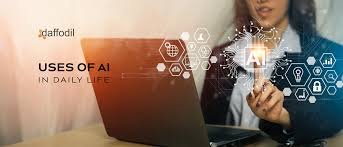Artificial Intelligence in Everyday Life: How AI Innovations Are Shaping Daily Activities and Consumer Products in 2024

1. Introduction to AI Innovations
Artificial Intelligence (AI) has become increasingly integrated into daily life, influencing how people interact with technology and shaping various consumer products. In 2024, AI innovations are enhancing convenience, personalization, and efficiency across a wide range of applications. From virtual assistants to smart home devices, AI is revolutionizing everyday activities and consumer experiences.
AI Technologies in Use: AI encompasses a range of technologies, including machine learning, natural language processing (NLP), computer vision, and robotics. These technologies enable devices and applications to learn from data, understand human language, recognize patterns, and perform tasks autonomously.
2. Enhancing Daily Activities
Smart Home Devices: AI-powered smart home devices are transforming residential living by automating tasks and improving convenience. Smart speakers like Amazon Echo and Google Nest use NLP to respond to voice commands, control home appliances, and provide information. Smart thermostats and security systems use AI to learn user preferences, optimize energy usage, and enhance home security. For instance, Nest Learning Thermostat adjusts temperature settings based on user behavior and environmental conditions.
Personalized Recommendations: AI algorithms are increasingly used to provide personalized recommendations in various domains. Streaming services such as Netflix and Spotify utilize AI to analyze user preferences and viewing habits, offering tailored content suggestions. Similarly, e-commerce platforms like Amazon use AI to recommend products based on browsing history, purchase behavior, and customer reviews. These personalized experiences enhance user satisfaction and drive consumer engagement.
Virtual Assistants and Chatbots: Virtual assistants and chatbots, powered by AI, are becoming integral to customer service and support. Companies like Apple and Microsoft offer virtual assistants such as Siri and Cortana that help users with tasks, answer questions, and manage schedules. AI-driven chatbots are also used by businesses to provide instant support, handle inquiries, and improve customer service efficiency.
3. Transforming Consumer Products
AI in Healthcare: AI innovations are making significant strides in healthcare, enhancing diagnostics, treatment, and patient care. AI algorithms are used to analyze medical images, predict disease outcomes, and personalize treatment plans. For example, IBM Watson Health leverages AI to assist in diagnosing cancer and recommending treatment options. Additionally, AI-powered health apps and wearables monitor vital signs, track fitness goals, and offer personalized health insights.
Autonomous Vehicles: AI is at the forefront of developing autonomous vehicles, which promise to revolutionize transportation. Companies like Tesla and Waymo use AI for advanced driver assistance systems (ADAS), enabling features such as adaptive cruise control, lane-keeping assistance, and automated parking. The goal of fully autonomous vehicles is to improve safety, reduce traffic congestion, and provide a more efficient transportation experience.
AI in Finance: AI is transforming the financial industry by automating processes, detecting fraud, and providing personalized financial advice. AI-powered tools are used for algorithmic trading, credit scoring, and risk assessment. Robo-advisors like Betterment and Wealthfront use AI to offer investment recommendations and manage portfolios based on individual financial goals and risk tolerance.
4. Future Directions and Considerations
Ethical and Privacy Issues: The widespread use of AI raises ethical and privacy concerns, particularly regarding data collection and algorithmic biases. Ensuring that AI systems are transparent, accountable, and respectful of user privacy is crucial for maintaining trust and addressing potential biases in decision-making processes.
Integration and Interoperability: As AI technologies continue to evolve, integrating and ensuring interoperability between different AI systems and devices will be important. Standardizing protocols and developing cohesive frameworks can enhance the seamless functioning of AI-powered products and services.
Continued Innovation and Development: The future of AI promises continued innovation, with advancements in areas such as general AI, quantum computing, and advanced robotics. Ongoing research and development will drive the next generation of AI technologies, offering new possibilities and applications across various domains.
In conclusion, AI innovations are shaping everyday life and consumer products in 2024, enhancing convenience, personalization, and efficiency. From smart home devices to autonomous vehicles and healthcare applications, AI is revolutionizing how people interact with technology and experience daily activities. Addressing ethical, privacy, and integration challenges will be essential for maximizing the benefits of AI and ensuring its positive impact on society.







